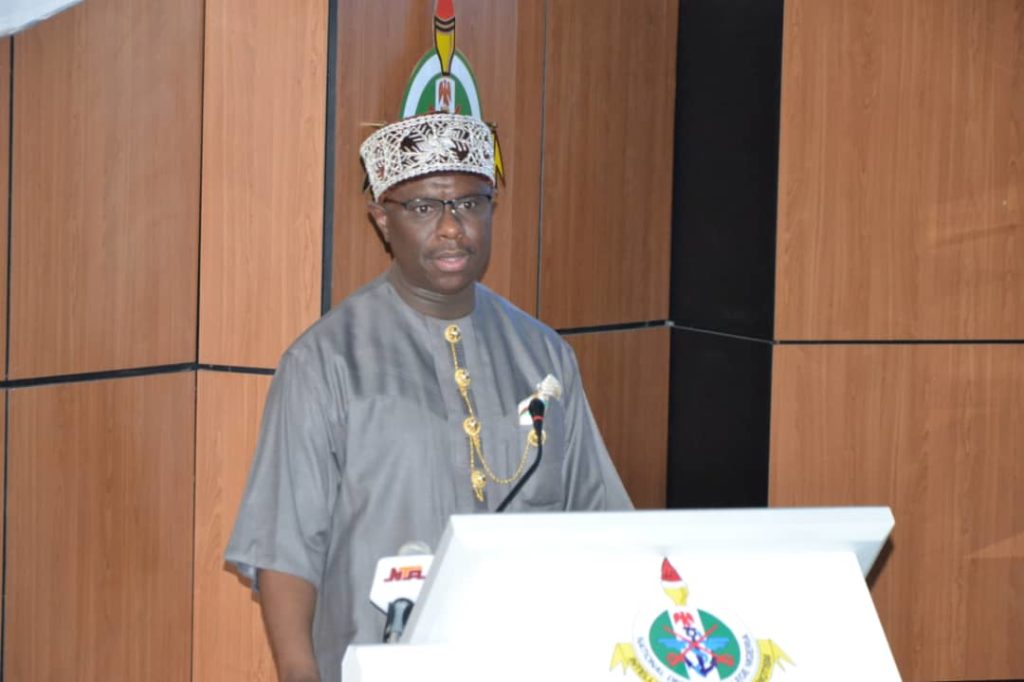The Director-General of Nigerian Maritime Administration and Safety Agency (NIMASA), Dr. Dakuku Peterside, says the agency has created operational conditions that have prompted a turnaround in prospects for maritime safety and successful utilization of the country’s enormous marine resources.
Peterside stated this in Abuja last week while delivering a lecture on “Maritime Safety and Shipping Development in Nigeria: Challenges and Prospects,” at the National Defence College.
He said NIMASA’s Total Spectrum Maritime Security Strategy had engendered significant improvement in maritime safety and security in the country.
The other measures adopted by the agency to better the state of safety and security in the marine environment, he said, include acquisition and utilization of marine technology infrastructure (maritime domain awareness); improved compliance monitoring and enforcement activities; training/re-training; and conscious efforts to ensure adequate funding for the maritime sector.
At NIMASA, he said, “We have moved from enforcement to education and enlightenment, to get operators to understand why they should comply with the rules and the risks in not complying, as well as help them to comply.”
Speaking further at the event, which had participation from several African countries, Peterside called for multilateral cooperation, especially among African countries, to ensure vessel safety and enhance opportunities for the exploitation of marine resources, saying maritime security is a global problem.
“Shipping, perhaps, is the most globalized of all great industries in the world. Approximately 90% of world trade is transported by ships. Such as the case of Nigeria, this figure is close to 95%. There are over 50,000 merchant ships trading internationally today, manned by more than a million seafarers and carrying every kind of cargo. Thus, the safety of vessels is critical to the global economy,” he stated.
He said maritime safety had moved from the approach of tending to react to marine incidents only after their occurrence to a proactive regime entailing the prior initiation of solutions based on risk analysis.
The DG said research had shown that most maritime accidents in Nigeria resulted from human factors, stressing that industry actors have a greater role to play in the new approach to maritime safety, as they have a better control over the human elements.
He said NIMASA was tackling the human factors that could imperil shipping in the country through its improved enforcement and monitoring mechanisms.
Underscoring the role of the human factor in the efforts to ensure safety of vessels, Peterside said a study of marine accidents/incidents in Nigeria between 2016 and 2018 showed that 38 per cent resulted from collision (poor vessel traffic) – human error; 19 per cent resulted from fire explosion; 12 per cent was due to capsize; grounding and sinking accounted for eight per cent each; and oil spill caused 15 per cent.
He identified the challenges associated with maritime safety and shipping development in Nigeria to include poor compliance with regulations, insufficient manning, professional competence issues, lack of capital, piracy, inadequate technological infrastructure, and pollution.
Peterside stated, “NIMASA has continuously dealt with safety challenges in the context of operations, management, surveying, ship registration, and the role of administration. Since international maritime safety has moved from a largely prescriptive and reactive safety scheme to a risk-based proactive regime, responsibility for safety is being placed on those in the industry to set out and create new perspectives on risk-based decision making.
“Hence, the way forward would be to adopt a Formal Safety Assessment (FSA) framework for maritime safety management.”
He said the FSA framework consisted of five key steps, namely, identification of hazards, assessment of risks associated with the hazards, finding ways of managing the risks, analysis of the risk control options (RCOs), and deciding on the options to select.
“The five-step process covers all aspects of safety analysis and suggesting suitable safeguards against all major and minor areas,” Peterside stated.
Peterside also disclosed that the six fast intervention security vessels, which NIMASA leased under its maritime security strategy project, had made tremendous impact.
The initiative, according to him, helped to increase Port State Inspection by 10.53 per cent in 2017, from 475 in 2016 to 525 in 2017 adding that it also facilitated an upswing in Flag State Inspection, from 77 in 2016, to 98 in 2017, representing a 27 per cent increase.
He said the rise in PSI and FSI had continued.
In his own remarks, Commandant of the National Defence College, Rear Admiral Adeniyi Osinowo, also emphasized the importance of maritime cooperation among African countries, particularly in the Gulf of Guinea, saying this is key to their maritime security, safety and development.
He said in Africa, there used to have excessive focus on land, with little or no interest in activities in the sea but increased political contacts among African leaders, according to him, have transformed that to “wealth blindness”.
“Wealth blindness in the sense that there is so much in the maritime environment in terms of economic resources and activities that could solve practically 70 to 80 per cent of our national economic problems. Our ability to explore and exploit the related opportunities are part of the problems,” he said.
Those present at the lecture included Chairman, NIMASA Board, General Jonathan India Garba (rtd), members of the agency’s management team, and course participants of the National Defence College.
Photo: DG, NIMASA, Dr. Dakuku Peterside, delivering a lecture on Maritime Safety and Shipping Development in Nigeria: Challenges and Prospects by Dakuku at the National Defence College, in Abuja recently.
Send your news, press releases/articles to augustinenwadinamuo@yahoo.com. Also, follow us on Twitter @ptreporters and on Facebook on facebook.com/primetimereporters or call the editor on 07030661526, 08053908817.

